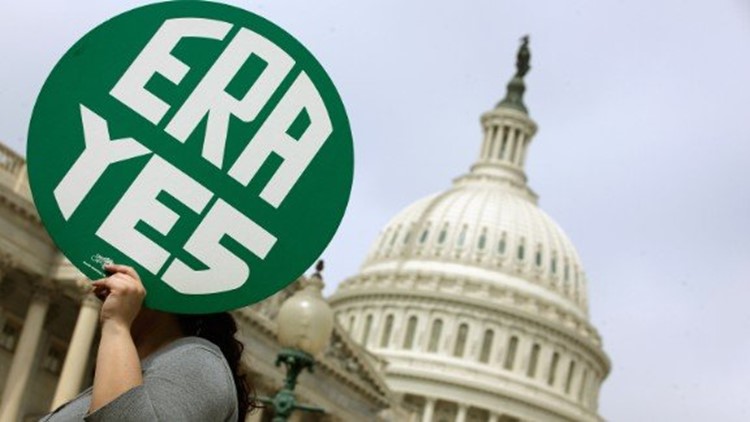When Virginia opened its 2020 legislative session this week, the Equal Rights Amendment, a century-long dream of progressives and feminists that would ban discrimination on the basis of sex and guarantee equality for women under the Constitution, appeared closer than ever to fruition.
State Democrats, who now control both chambers of the legislature as well as the governor’s mansion, are pushing forward with their efforts to make the commonwealth the 38th — and potentially final — state to ratify the amendment.
But opponents, who claim the ERA will pave the way for greater abortion access and say equal-rights protections for women have already been enshrined at federal and state levels, have vowed to block the national ratification effort. And it’s unclear whether actions taken by Congress and dozens of states more than 40 years ago will stand up under legal challenges from conservatives who say the window to ratify the ERA expired decades ago.
That was the view of the Justice Department’s Office of Legal Counsel made public on Wednesday, which, citing a 1979 congressional deadline, blocked the archivist of the United States from verifying the amendment should it be approved by the necessary three-fourths of state legislatures.
Virginia Democrats, however, are pressing on. The state Senate advanced a bill on Thursday to ratify the amendment, and House Speaker Eileen Filler-Corn, the state’s first female speaker, has vowed to pass the ERA in her chamber.
“For too long, women have not had the protections from discrimination we deserve in the U.S. Constitution, and with passage of the ERA, we’ll be that much closer to living in a world where women and girls have the same opportunities as men,” Virginia Del. Jennifer Carroll Foy, who introduced the House resolution to ratify the ERA, said in a statement to CNN Wednesday.
Conservative opponents are ready.
Douglas Johnson, the National Right to Life’s senior policy adviser, expects that once Virginia or another state ratify the amendment, the national archivist will be sued by liberal attorneys general in federal court, where he’s confident the anti-ERA position will prevail.
“The narrative that the ERA is on the verge of ratification,” Johnson said, “is pure political theater.”
A dispute over deadlines
First proposed by suffragist Alice Paul, the ERA, then known as the “Lucretia Mott Amendment,” was first introduced to Congress in 1923, but the effort to pass it — which requires the approval of three-fourths of states, or 38, to be added to the Constitution — didn’t gain real traction until the women’s movement of the late 1960s and ’70s. In March 1972, Congress finally passed the ERA and sent it to the states to ratify within a seven-year window, later extending the deadline to 1982.
In the mid-70s, the ERA looked headed for ratification. But after an initial flurry of approvals, support for the ERA stalled under pressure from social conservatives and anti-feminists like the late Phyllis Schlafly, the organizer of the “STOP ERA” campaign. She claimed, among other things, that it would lead to more widespread abortion and require women to serve in the military.
“ERA means abortion funding, means homosexual privileges, means whatever else,” she once said.
By the 1982 deadline, only 35 states had ratified the amendment, though five that had earlier passed it had by then rescinded their support. Despite the ERA being reintroduced in every Congress since the early 1980s, the effort to add it to the Constitution languished for decades.
Recently, the rise of the #MeToo and Time’s Up movements, along with more women in legislative power, has renewed interest in passing the ERA. Two other states — Nevada in 2017 and Illinois in 2018 — have since ratified it, bringing the total number of states to 37. (ERA proponents reject the argument that states can rescind ratifications they’ve already passed.)
The possibility that a 38th state is primed to pass the ERA has already triggered conservative legal challenges.
Last month, three conservative-leaning states — Alabama, South Dakota and Louisiana — filed a federal lawsuit against the archivist of the United States, David Ferriero, in an attempt to stop the ERA from being added to the Constitution.
“The people had seven years to consider the ERA, and they rejected it. To sneak it into the Constitution through this illegal process would undermine the very basis for our constitutional order,” Alabama Attorney General Steve Marshall said in a statement.
He argued that while Alabama, Louisiana and South Dakota are “firmly committed to equality,” the ERA “would not promote true equality, but rather a far-left agenda.”
The states argued that Ferriero was “acting illegally” by continuing “to hold open the ratification process” and refusing to recognize some states’ rescissions of the amendment. In the amendment process, after verifying that it has the required number of state ratifications, the National Archives and Records Administration’s Office of the Federal Register drafts a formal proclamation for the archivist to certify that the amendment is valid and is part of the Constitution.
In response, the NARA paused and asked the Justice Department for guidance. On Wednesday, its Office of Legal Counsel said that because 38 state legislatures didn’t ratify before the initial 1979 congressional deadline, the amendment was no longer pending. The OLC even disagreed with its own 1977 opinion that concluded Congress could extend a ratification deadline on an amendment pending before the states, and argued that Congress cannot revive the ERA by retroactively removing the deadline.
The “only constitutional way” to proceed, the OLC said, would be to restart the amendment proposal process.
“Congress required that the ERA Resolution be ratified within a fixed period, and whether the effective deadline was in 1979 or 1982, that time has come and gone.”
The opinion, which NARA said it would abide by, likely ensures that it will be left to the courts to decide what happens next if Virginia passes the ERA, explained Stephen Vladeck, a CNN legal analyst and professor at the University of Texas School of Law.
But it doesn’t prevent states from pushing forward with their own ratification efforts.
“This OLC opinion is not binding on Congress, the courts, or the states that have expressed their ongoing will to give women constitutional equality,” said the Equal Rights Amendment Coalition.
Why progressives fight on
In the years since 1982, many states have passed constitutional amendments or specifications that address discrimination based on sex, with some containing language similar to the ERA itself.
Proponents of the amendment say it’s not enough.
“State laws and even state constitutions are relatively easy to change, whereas the US Constitution is not,” Virginia Democratic Sen. Jennifer McClellan, a chief sponsor of the Senate resolution, told CNN.
The most immediate practical impact of an ERA would be in better enforcing criminal law in cases of domestic violence, Linda Coberly, a Chicago-based attorney who chairs the national ERA Coalition’s Legal Task Force, told CNN.
Although some of the arguments pushed by Schlafly in the 1970s — including opposition to military service for women and support for a woman’s role as a homemaker — have become largely outdated as women have gained rights and more equal status in the decades since, abortion remains a flashpoint.
“This is not the Equal Rights Amendment, but rather the Everything Related to Abortion Act, as this measure will, in fact, do what Roe v. Wade and Doe v. Bolton do not — create an actual place in our Constitution on which to hang the interest of the abortion industry,” several organizations including the Eagle Forum, a conservative group founded by Schlafly, said in a letter this week to the US Congress and Virginia General Assembly.
“Ironically, the arguments used for ERA in the 1970s are moot today as laws requiring equal pay, forbidding discrimination by sex or barring entry into schools, the workplace or public life have long since been enacted,” the letter’s signatories argue. They point to the NARAL Pro-Choice America’s stance that “the ERA would reinforce the constitutional right to abortion by clarifying that the sexes have equal rights, which would require judges to strike down anti-abortion laws because they violate both the constitutional right to privacy and sexual equality.”
Coberly, however, said abortion rights are guaranteed without an ERA and the basis for those cases has nothing to do with the amendment. She also said ERA would address several other aspects of reproductive health than abortion, adding that “the line that is to be drawn by opponents is extreme and a distraction.”
McClellan told CNN that “a lot of opposition is based on fear or misinformation.”
“I just don’t understand why when we were founded on the ideal that we’re a government by, of, and for the people and equality and justice for all that we’re going to deny that to over half the population,” she said.
Heidi Schreck, an actress and the playwright of “What the Constitution Means to Me” who is also an ERA Coalition board member, said in November that ratifying the ERA “is crucial if we want to live in a country where equal pay is a reality, sex and gender discrimination is unacceptable, and the epidemic of sexual and physical violence is no longer tolerated as the norm.
“It also matters deeply on a symbolic level,” she continued in a statement. “All people should know their lives are valued, and deserve to be valued, by our legal system.”
That view is shared by Virginia Democrats.
State Attorney General Mark Herring, who believes the state legislature will ratify the amendment by the end of the month, said he is prepared to go to court if necessary. And Foy told CNN she was undeterred by the OLC’s opinion.
“Women won’t back down from our fight to ratify the ERA,” she said. “I know I won’t — too much is on the line for women and families.”



